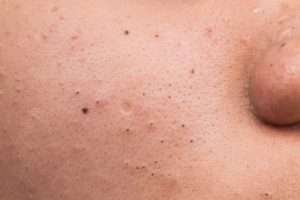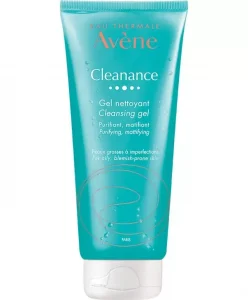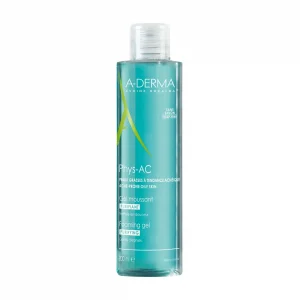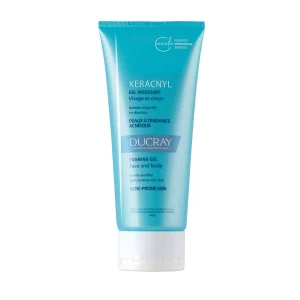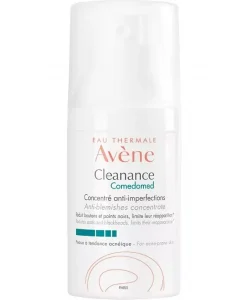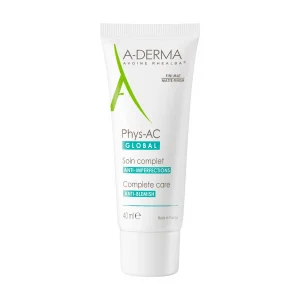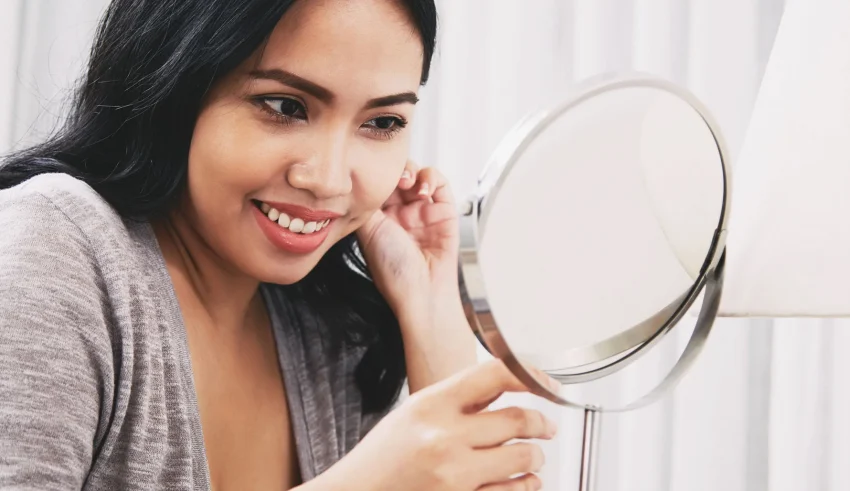
Blackheads, much like cockroaches, are the worst for these very reasons: They are abundant, hard to hide, and pop up again and again. But before you put your fingers in a position to squeeze, step away from the mirror and keep reading this article from The Dermo Lab. We interviewed the dermatologist and cosmetologist Dr. Nakhlé Ayoub about the cause of blackheads and the different ways to remove them to reveal clearer and healthier skin.
First things first: What are blackheads?
Before you try to clear your skin of blackheads, it’s helpful to understand what they really are. According to Dr. Nakhlé Ayoub, a blackhead is a material held in the channels of the sebaceous glands composed primarily of keratin and whose end oxidizes upon contact with air and turns black.
The technical name for a blackhead is an open comedo. There are two different types of comedones: open comedones (blackheads) and closed comedones (whiteheads). The main difference between these two is that blackheads are dark because the pores are open, whereas whiteheads are closed comedones, which means that the surface of the plugged follicle is covered by a thin layer of skin, resulting in a lighter color.
Blackheads are a mild type of acne that usually form on the face, but they can also appear on the following parts of the body:
- back
- chest
- neck
- arms
- shoulders
What causes blackheads?
Blackheads have many underlying causes. They most often appear during puberty, when hormones cause an increase in sebum or oil production and the pore becomes clogged. Hormones can also fluctuate and cause blackheads during menstruation, pregnancy, and in people with polycystic ovary syndrome or other hormonal syndromes where there is an excess of androgens.
Other contributing factors include taking steroids, wearing tight clothing and hats or helmets when sweating, and using thick, occlusive creams or oil-based products that can clog pores.
Genetics can also be involved in the development of blackheads. This means that if your siblings or parents are prone to blackheads, there’s a good chance that you are too. Pore size is determined by genetics and people with larger pores are more likely to have blackheads.
How to remove blackheads?
1- Cleanse your face
Wash your face when you wake up and before going to bed to remove the accumulation of sebum. Choose a mild cleanser that doesn’t make your skin red or irritated. Some acne cleansers contain antibacterial ingredients that kill the P. acnes bacteria. Be careful, cleansing more than twice a day can irritate your skin and make your acne worse.
Ready to find your cleanser? Here are our top picks for the best facial cleansers for acne-prone skin.
Eau Thermale Avène Cleanance Cleansing Gel
A-Derma Phys-AC Foaming Gel
Ducray Keracnyl Foaming Gel
2- Apply a treatment product
You should consistently use treatment products that help remove debris from your pores.
A treatment product reduces oil build-up and pore-clogging. It also removes excess oil and limits bacterial adhesion. As soon as you start using them, your skin will become clearer and healthier.
Below are 3 products that quickly tackle blackheads without stripping your skin in the process.
Eau Thermale Avène Cleanance Comedomed
A-Derma Phys-AC Global:
3- Gently exfoliate on a regular basis
In the past, you may have heard that exfoliation harms acne. This may be true for inflammatory acne, as the process can cause additional redness and irritation. For blackheads, however, regular exfoliation can help remove excessive amounts of dead skin cells that can lead to clogged pores. The process can also gently remove existing blackheads.
“It is well known that patients who have undergone rhinoplasty or facial cosmetic surgery often experience blackheads, whiteheads, and acne in the weeks following surgery,” explains Dr. Nakhlé Ayoub. This is because mechanical stimulation of the area causes blackheads to worsen.
He adds that the most effective agents for blackhead removal are mainly: fruit acids, salicylic acid, alpha and beta hydroxy acids (AHA and BHA), and topical retinoids. They eliminate blackheads through their exfoliating effect and also correct the obstruction of the channels where the keratin material is retained.
AHAs and BHAs work by removing the top layer of your skin. In theory, this can improve the appearance of wrinkles and age spots, while cleaning pores and softening your skin.
4- Consider a chemical peel
Chemical peels remove clogs and dead skin cells that contribute to blackheads. During a peel, a powerful chemical solution is applied to the skin. Over time, the top layers of skin are peeled away, revealing smoother skin underneath. Mild peels are available over the counter, while more powerful peels are performed by dermatologists or other skin care professionals.
In theory, smoother, fresher skin should appear following the process. This treatment method can be especially useful if you are also looking for anti-aging benefits.
5- Try laser and light therapy
Laser and light therapies use tiny beams of intense light to decrease sebum production or kill bacteria. Lasers and light beams reach the surface of the skin to treat blackheads and acne without damaging the upper layers of the skin.
Is it possible to squeeze blackheads?
Dr. Nakhlé Ayoub explains that squeezing blackheads can be done more or less effectively during cleansing sessions at the esthetician’s or sometimes at the dermatologist’s or by the patient himself. However, he adds that the mechanical removal of blackheads by pressing on the skin can stimulate the surrounding glands, which will cause a new outbreak of blackheads in the area that has been mechanically solicited. As a result, further aggravation of blackheads will occur.
How to prevent blackheads?
According to Dr. Nakhlé Ayoub, prevention involves the regular use of creams containing fruit acids, salicylic acid, and retinoids. It is also important to avoid aggravating factors such as the application of creams that are too oily. In summer, it is recommended to use a fluid or gel sunscreen rather than a cream. Gels and fluids have a much less obstructive effect on comedones than greasy creams.
Any product that contains oil can contribute to the appearance of new blackheads. Choose oil-free or non-comedogenic makeup, lotions, and sunscreens to avoid aggravating your problem. Non-comedogenic means that the product in question does not cause blackheads or clogged pores. Not all products are non-comedogenic, so read the labels carefully.
It’s also important to avoid sleeping with makeup on. At the end of a long day, the last thing you want to do is remove your makeup. However, sleeping with your makeup on can lead to an increase in blackheads. If it stays on all night, even non-comedogenic makeup can clog your pores.
Last Updated on April 16, 2024
